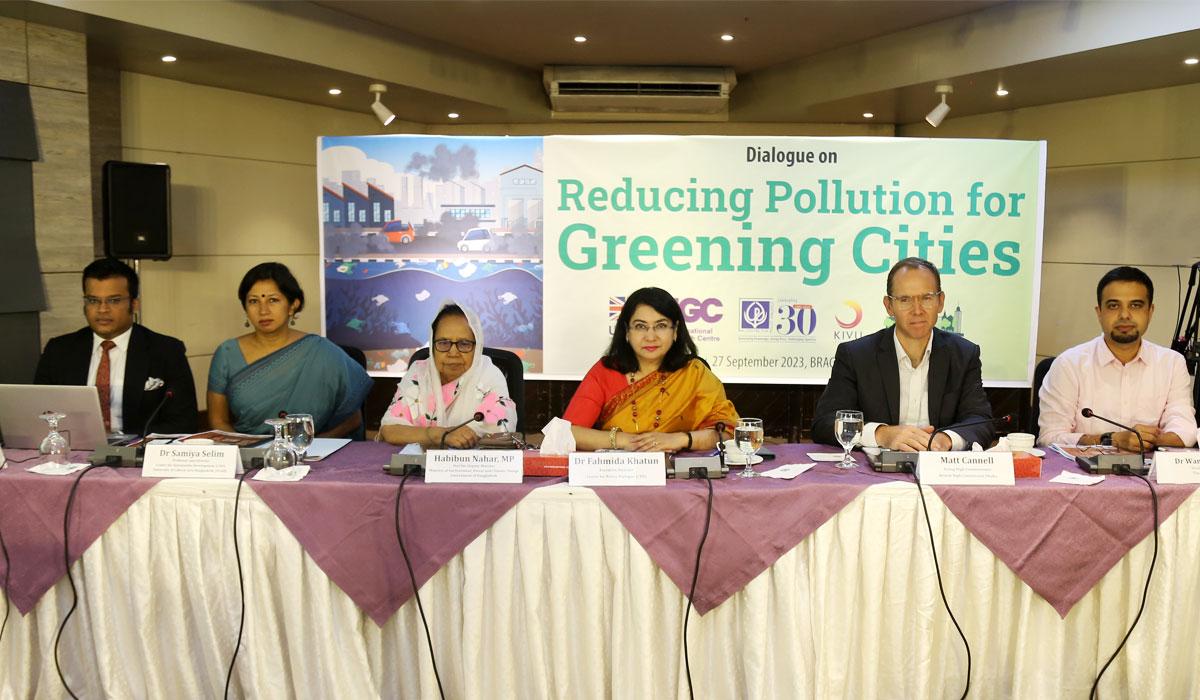
The air quality in Dhaka city has deteriorated significantly, witnessing a 13 per cent increase in pollution levels since 2020. The citizens of Dhaka took 2,117 days off from work and school in the last year due to the symptoms attributed to air pollution. Along with air pollution, plastic pollution has also become a major concern, with 63 per cent of households not recycling durable plastics due to limited awareness and lack of waste segregation habits. Citizens are concerned about the consequences of pollution, but they have not taken the necessary steps to make behavioral changes that would help reduce their contributions to the problem.
These observations emerged at the dialogue titled ‘Reducing Pollution for Greening Cities’ organised by the Centre for Policy Dialogue (CPD) in collaboration with KIVU International and the International Growth Centre (IGC), with support from the Foreign, Commonwealth, and Development Office (FCDO) of the United Kingdom (UK), under the programme ‘Green Cities Initiative’. The dialogue was held on Wednesday, 27 September, 2023 at the BRAC Centre Inn, Dhaka.
The dialogue was based on a survey of 500 households in Dhaka city which explored residents’ perceptions of air and plastic pollution, their understanding of the causes and impacts of pollution, as well as their willingness to change their own behaviour or support policies with the aim of reducing pollution in the city.
The survey revealed that over 33 per cent of respondents believed that combatting air pollution necessitated collaboration between the private and public sectors. Furthermore, the survey shed light on another critical issue — a striking 79 per cent of respondents acknowledged not segregating their household plastic waste, thereby exacerbating the problem of plastic pollution.
Dr Fahmida Khatun, Executive Director, CPD, chaired the session and said, ‘Sufficient investments in sustainable solutions, such as an accessible public transit system and efficient waste management, are crucial for motivating people to actively contribute to the reduction of air and plastic pollution’.
In his keynote presentation, Mr Syed Yusuf Saadat, Research Fellow of CPD, emphasised a range of policy recommendations spanning regulatory, economic, institutional, and social measures aimed at tackling air and plastic pollution.
‘To combat air pollution, the Government of Bangladesh (GoB) should phase out fixed chimney brick kilns and formulate regulations for construction sites’ said the Research Fellow.
The GoB should halt new coal-based power plants, incentivise renewable energy, establish widespread air quality monitoring through the Department of Environment (DoE) and raise public awareness about the detrimental impacts of pollution on human well-being.
While presenting recommendations for reducing plastic pollution, he urged ‘The GoB should ban polythene bags and encourage the use of paper and cloth bags, or bags made of sustainable materials.
He suggested that the government should consider bringing plastic products made with less than 30 per cent recycled plastic under taxation. Recycling centres for plastics need to be established by the Government and the links between the local recycling shops and manufacturers need to be strengthened. The government should also launch educational campaigns to raise awareness about the environmental impact of plastic pollution and promote responsible plastic use.
‘If people take responsibility for their actions that contribute to pollution and understand how their actions can have a significant collective impact, we can make substantial progress in combatting the different kinds of pollution’ said the Chief Guest, Ms Habibun Nahar, MP, Hon’ble Deputy Minister, Ministry of Environment, Forest and Climate Change (MoEFCC), Government of Bangladesh.
She emphasised the importance of educating children from a very young age about actions that contribute to pollution. This approach can help nurture a more responsible and environmentally-conscious generation.
The Guest of Honour, Mr Matt Cannell, Acting High Commissioner, British High Commission Dhaka, emphasised the challenges of reducing pollution and pointed out that Bangladesh already has several policies in place. However, the primary hurdle lies in effectively implementing these policies in a sustainable way.
Commenting on the challenges, Mr Cannell recommended ‘Public debates may play a crucial role in encouraging citizens to reduce their contributions to pollution’.
Dr Samiya Selim, Professor and Director, Center for Sustainable Development (CSD), University of Liberal Arts Bangladesh (ULAB), said that incorporating pollution-related concepts into the education system is essential. Students should grasp the interconnectedness of pollution and understand the multifaceted harms caused by the use of plastic.
‘Emphasising the economic impact of illnesses caused by air pollution can serve as a compelling motivator for both citizens and the government to take proactive steps in pollution reduction,’ recommended Dr Wameq A Raza, Health Specialist, The World Bank.
Mr Bareesh Hasan Chowdhury, Legal Researcher, Bangladesh Environmental Lawyers Association (BELA) underscored that the pollution from brick kilns is a longstanding concern.
He said that despite previous legal actions leading to brick kiln shutdowns, they often resume operations shortly thereafter. The challenge lies not in the absence of pollution-reducing policies, but rather in their effective implementation.
During the open floor discussion, participants highlighted that a significant portion of the public remains unaware of the progress made in pollution reduction efforts. Consequently, there is a pressing need to enhance awareness so that citizens can better understand and appreciate the ongoing initiatives aimed at reducing pollution. A common misconception is that vehicles are the main source of air pollution, often overlooking other significant contributors like brick kilns. It was also highlighted that the current cost structure for waste processing is insufficient. This issue could potentially be resolved if citizens are willing to pay more for waste management services.
High-level policymakers, diplomats, foreign delegates, researchers, development practitioners, academics, business leaders, civil society representatives, international development partners, and journalists participated in the dialogue and shared their valuable insights.


